
Super Car was a small manufacturer of three-wheeled trucks based in Agios Vassileios, near Patras, Greece.
It operated between 1968 and 1974, producing light trucks powered by 1300cc Volkswagen air-cooled engines. Two different models were produced.

Super Car was a small manufacturer of three-wheeled trucks based in Agios Vassileios, near Patras, Greece.
It operated between 1968 and 1974, producing light trucks powered by 1300cc Volkswagen air-cooled engines. Two different models were produced.

Theologou was one of the first vehicle manufacturers in Greece. It was created by Nikos Theologos, a Greek mechanic who had lived and worked for a few years in the US, and founded this company after he returned to Athens, Greece in 1906. Around 1916 he designed and constructed a light passenger car with a motorcycle engine; according to his descendants, the efforts had started in 1908, and since 1916 a small number were built. His company, nonetheless, produced a variety of bus and truck bodies, mostly on Ford chassis in the 1920s. By the late 1920s it was facing strong competition by larger companies like Tournikiotis and Athena in Athens, Bouhagier in Patras and others, which also produced vehicles on imported chassis, and was soon eclipsed by them.
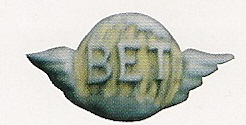
Biotechnia Ellinikon Trikyklon, or BET, was a small vehicle manufacturer founded in Athens by Petros Konstantinou. It was one of several manufacturers - the first appearing in the early 1940s - that converted BMW or other motorcycles into light utility three-wheelers. In 1965 it entirely designed and built a small five-seat passenger car with a BMW 125cc motorcycle engine. Although the type was certified, only one was built due to problems in availability of parts for further production. Following this design, three-wheeled truck models were developed and produced. A second passenger car model was designed and introduced in 1973, known as model 500, with a Fiat 500cc engine. With metal body, seating up to five passengers and featuring very good road handling, it was a rather advanced three-wheeler for its time. It was certified for production and 15 were built, of which one survives to this date in excellent condition. There were even talks with a South African company involving plans for exports or even transfer of production to that country, but they were never realized. The company ceased production in 1975.

STYL KAR was named after its founder, the engineer Stylianos Karakatsanis. Its entire history is representative of many Greek companies who were engaged in the construction of simple utility vehicles.
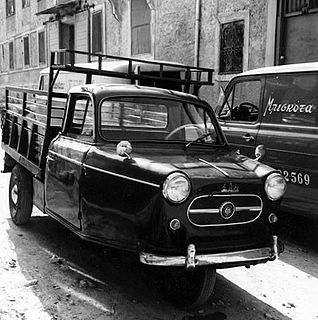
The name SAM stands for Stephanos A. Mbaltas, the founder of this Greek company, one of several that produced three-wheeler trucks in that country, in business between 1966 and 1974. Its first models used 1200cc Volkswagen air-cooled engines, while Ford 1300cc engines powered later models. The chassis developed by SAM was very robust and some of its trucks were surviving 30 years after the company went out of business.
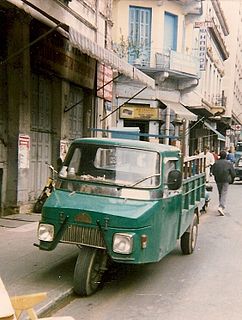
Ros was the trade name of vehicles produced by the Greek company 'Stavros Konstantinides O.E.', based in Athens. The Ros three-wheeler trucks were the most successful of its kind in Greece, having been produced by the thousands. Ros surpassed in sales even "Greek classics" like Alta and Styl Kar, and the characteristic shape of its trucks could be seen for several years in every corner of the country. And for good reason: The 'Rosaki' was one of the most robust and reliable vehicles ever used in Greece. In 2006, 30 years after the end of three-wheeler production, several Ros were still in use in excellent condition, more than any other three-wheeler type.

AutoDiana was a Greek truck manufacturer based in Thessaloniki, in operation between 1975 and 1984. Its main product was the 'Unicar' model, a rather heavy-looking 4x4 multi-purpose truck. This robust vehicle had a payload of 1500 kg and used Mercedes-Benz Diesel engine and Dodge axles. Its fate, along with similar Greek multi-purpose trucks like the Petropoulos Unitrak, the Agricola, the Motoemil Autofarma, the Balkania Autotractor, the Namco Agricar and others, was sealed when a change of Greek law in 1984 modified taxes and duties for such 'farm' vehicles. Production was terminated the same year ending a "career" of decent sales among customers in the Greek countryside.
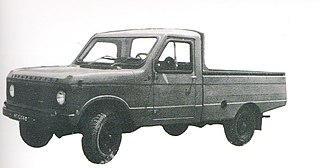
Balkania was the trade name of 'K. Zacharopoulos A.B.E.E.' a Greek industrial and trading company based in Athens that produced 4x4 jeep-type vehicles and 4x4 trucks. Since 1945, K. Zacharopoulos had been involved in vehicle repair and rebuilding. The Balkania company was founded in 1954 and since 1972 it imported Romanian and Indian vehicles. In 1975 it designed and introduced its own Autotractor model, a 4x4 multi-purpose truck with a Mercedes-Benz 3200 cc Diesel engine, metal cabin and a payload of 1,500 kg (3,307 lb). In 1979 the model was redesigned, with a modern synthetic cabin. It was produced, as some similar Greek vehicles, until a change of a favorable categorization for agricultural vehicles in 1984 limited its prospects. The vehicle was modestly successful, as it exhibited certain quality problems.

Scavas is the name of sports cars designed by Greek engineer Vassilios Scavas that were never industrially produced.
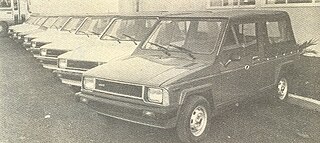
Automeccanica was a Greek automobile producing company. Founded in 1979, it was one of the companies that produced the "passenger-utility" type of vehicle popular in Greece at the time for tax categorization reasons. Its creators were former executives of Autokinitoviomihania Ellados a company founded in 1975 to also produce vehicles of this type – it assembled Italian Fissore models based on Fiat products, as well as other Fiat models and variants. Automeccanica followed a different path, building the Zebra model, a passenger-utility car based on the Daihatsu Charade, as well as assembling the Charade itself. In 1985, when the law favoring the Zebra-type vehicles changed, Automeccanica stopped its production and started licence production of the Soviet Lada Niva model, while it developed its own cabrio-version of the car. In 1988 it acquired its former "father" company, Autokinitoviomihania Ellados and the latter's factory in Thiva. Automeccanica went out of the car-construction business in 1995.

EBIAM was a Greek company based in Thessaloniki that, among others, produced 4x4 trucks. It belonged to a generation that benefited from a Greek law classifying any vehicle that could be used for agricultural purposes as "agricultural machinery".

Candia is a Greek company producing Agricultural machinery and equipment, based in Herakleion, Crete. It is representative of many companies in this country, that produced multi-purpose light farm vehicles.

Hercules was a Greek manufacturer of agricultural machinery based in Kerkyra (Corfu). It also produced light vehicles categorized as "farm equipment" according to Greek law, including light all-terrain vehicles. The latter used Namco parts and Mitsubishi, Kubota and Ruggerini engines. Small numbers of the particular type were produced between 1980 and 1983.

Emporiki Autokiniton was a major Greek automobile trading and industrial company. Systematic vehicle production started in 1968, while the company built a modern vehicle assembly factory in the north of Athens in 1971. A large number of Mazda, Opel and, later, Alfa Romeo models were assembled – usually with a significant proportion of parts locally produced. The company also introduced modified versions of Mazda trucks, including longer versions of the B1500 and B1600 light trucks. A number of the latter was also produced with the company’s own Grezda brand name in the early 1980s, mostly for export. Emporiki Autokiniton was seriously affected by problems largely connected with the labor unrest of the 1980s in Greece and production was eventually terminated in 1985, after a failed attempt to produce a jeep and a 2-tonne truck type of own development.

Dinap was one of the smaller Greek machine and truck manufacturers with its factory on Liosion St., in Athens. The Dinap 1200 was a three-wheel truck produced in the second half of the 1960s. It was powered by a 1200cc, 34 hp (25 kW) air-cooled Volkswagen engine and could legally carry 1,000 kg (2,205 lb). This load was higher than the equivalent for most other three-wheel trucks, but this made little difference since those vehicles were frequently loaded with up to 3 tons.

Bouhagier Patras or Buhayer Patras was considered to be the longest-lived vehicle body manufacturer in Greece. It was founded in 1890 and dissolved in 2004.

The Pony Super was a car built by NAMCO, a Greek vehicle manufacturer, between 1985 and 1992. It represented an effort by this company to produce a successor to its first generation Pony (Pony-Citroën), following the same principle of a versatile, cheap vehicle that could form a basis for several versions for different uses. In complete contrast to its predecessor, though, it failed in the Greek market, produced in only a few hundred units.
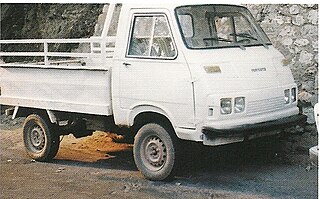
Record A.E.B.E. was the name of a Greek company producing agricultural machinery and vehicles, founded in Heraklion, Crete in 1957 and dissolved in 1999.

Diana (Διάνα) is the brand name for agricultural machinery produced by Irene Chrissadakou A.E. a company located in Tavros (Athens), Greece. Founded in 1976, it is one of the most successful in its field, also managing to survive the crisis in Greek manufacturing industry of the 1980s and 1990s.

Biomot was a small manufacturer of three-wheeled trucks and other metal products, based in Patras, Greece. Its trucks, produced since 1967, originally used rear-mounted VW air-cooled engines, as well as other VW parts. By 1975 the market for these vehicles had shrunk in Greece, being replaced by four-wheeled imported types. A new “modernized” front-engined model introduced by Biomot failed to save the company.

Agrocar (ΑΓΡΟΚΑΡ) was the brand name used by Athens-based G. Makris – E. Ladopoulos O.E., a small company producing agricultural equipment; trucks, mostly used by farmers around Greece, were also produced for a few years. The trucks, classified in Greece as “agricultural machinery”, were introduced in the early 1970s, and used Mercedes-Benz engines and certain mechanical parts by Jeep.